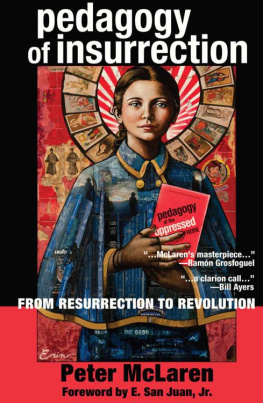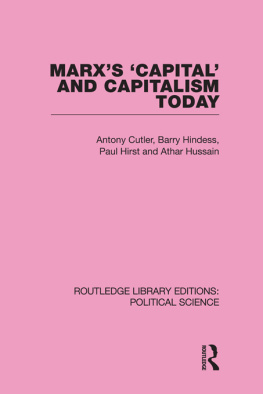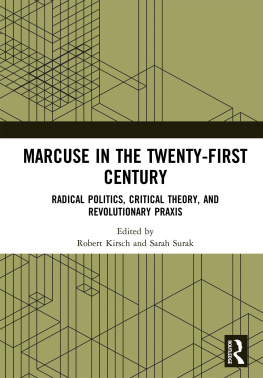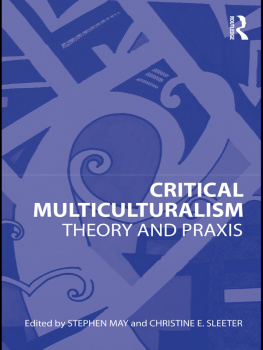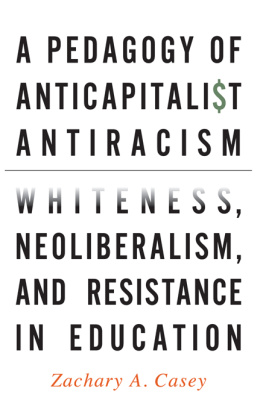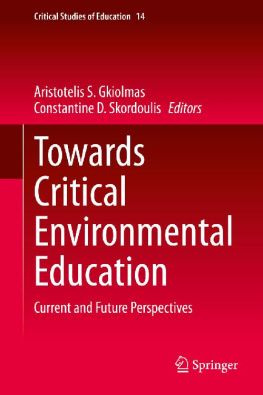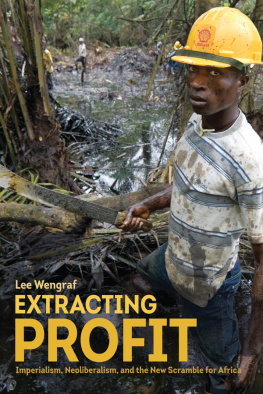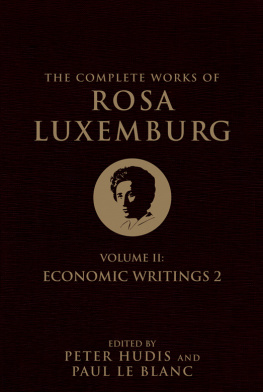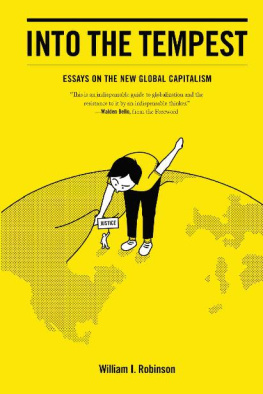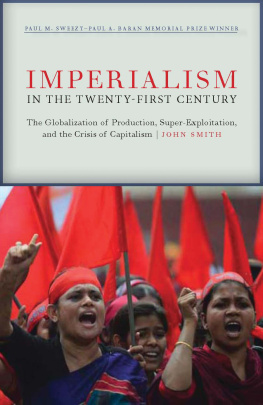Acknowledgments
We would like to acknowledge the publishers and organizations who granted us permission to reprint revised versions of our essays in this book.
is a revised version of Peter McLaren and Ramin Farahmandpurs Reconsidering Marx in post-Marxist times: A requiem for postmodernism? Educational Researcher 29, no. 3 (April 2000): 2533.
is a substantially revised version of Peter McLaren and Ramin Farahmandpurs Freire, Marx, and the new imperialism: Toward a revolutionary praxis, in The Freirean Legacy: Educating for social justice, ed. J. J. Slater, S. M. Fain, and C. A. Rossatto, 3756. New York: Peter Lang, 2002.
is a substantially revised version of Peter McLaren and Ramin Farahmandpurs Critical pedagogy, postmodernism, and the retreat from class: Towards a contraband pedagogy, in Postmodern excess in educational theory: Education and the politics of human resistance, ed. D. Hill, P. McLaren, M. Cole, and G. Rikowski, 167202. London: Tufnell Press, 1999.
is a substantially revised version of Peter McLaren and Ramin Farahmandpurs Critical multiculturalism and the globalization of capital: Some implications for a politics of resistance, Journal of Curriculum Theorizing 15, no. 4 (1999): 2746.
is a revised version of Peter McLaren and Ramin Farahmandpurs Globalization, class, and multiculturalism: Fragments from a red notebook, in Global learning, ed. M. Singh, 5594. Altona, Victoria, Australia: Common Ground Publishing, 2002.
is a revised version of Peter McLaren and Ramin Farahmandpurs Teaching against globalization and the new imperialism: Towards a revolutionary pedagogy, Journal of Teacher Education 52, no. 2 (2001): 13650.
is a substantially revised version of Peter McLaren and Ramin Farahmandpurs Educational policy and socialist imagination: Revolutionary citizenship as a pedagogy of resistance, Educational Policy: An Interdisciplinary Journal of Policy Practice 15, no. 3 (2001): 34378.
is a revised version of Peter McLaren, Gregory Martin, Ramin Farahmandpur, and Nathalia Jaramillos Teaching in and against empire: Critical pedagogy as revolutionary praxis, Teacher Education Quarterly 31, no. 1 (2004): 13153.
is a revised version of Peter McLaren and Ramin Farahmandpurs Critical Revolutionary Pedagogy at Ground Zero: Renewing the Educational Left after 9/11. The original version is copyright 2003 from Education as enforcement: The militarism and corporatization of schools by K. J. Saltman and D. A. Gabbard. Reproduced by permission of Routledge/Taylor & Francis Books, Inc.
Afterword
June 3, 2004
St. Petersburg, Russia
MANY LEFTIST EDUCATIONAL THINKERS OF THE DAY, not to mention the educational mainstream, seem to think that capitalism is like a dilemma to which there is no solution. Capitalism has to be accepted, and human beings must learn to cope and live with it. Peter McLaren and Ramin Farahmandpur do not, however, belong to that celebrated league of educational scholars. As their Teaching against Global Capitalism and the New Imperialism demonstrates in its unique way, a dilemma is not the only possible way of characterizing capitalism and its devastating impact on education and other life-sustaining practices. In contrast to an unresolvable dilemma, McLaren and Farahmandpur instead conceptualize capitalism as a problem that can and must be solved. As they argue in their book, capitalism is a purely social and ideological construct, for its only essence is its own ideological structure. That structure and logic needs to be exposed and analyzed and then dismantled and destroyed.
Teaching against Global Capitalism and the New Imperialism is one of the few books that overtly uses a critique of political economy in the context of critical education. Moreover, McLaren and Farahmandpur are one of the few critical educational theorists and leading spokespersons among critical educators who have the foresight, courage, and tenacity to apply persistently concepts like imperialism and class struggle in their analysis of globalization and new forms of imperialism. In their analysis and rhetoric, they combine two registers of scholarly writing, namely, those that combine political activism, civil disobedience, and revolutionary struggle with solid sociological analysis. What is especially remarkable in McLaren and Farahmandpurs work is that it is uncompromisingly Marxist; it stands alone in the field of critical educational studies. Certainly there have been numerous books on the topic of globalization and education in recent years but none that betray such a relentless drive to unpack capitalisms hydra-headed dimensions and pose socialism as an alternative.
The authors rank among the fiercest critics of U.S. imperialism in discussing not only education and its pitfalls but also other sociopolitical traumas of the current neoliberal era. They emphasize that the struggle against capitalist globalization and new incarnations of imperialism is not simply one among many other political fights but the primary struggle that strategically supersedes all others. McLaren and Farahmandpur are unequivocal in their assertion that it is capitalist social relations of production and its practices of valorization that put and keep people in a consumer nirvana of political quietude and that it is our subjectivity held hostage by capitalism that must be remade into a critical engine of revolutionary consciousness in order to change the world. It is precisely the question of class struggle that is too often missing from the otherwise sophisticated analysis of critical educators and political economists.
McLaren and Farahmandpur also put the question of class consciousness back on the agenda of critical educational theory. The question has to do, of course, with the role of culture and education in fostering working-class consciousness (without fetishizing it) and in catalyzing political organization, reflection, and action. In their analysis, not only is class antagonism still a valid category, but it becomes the cornerstone of critical educational analysis. By taking seriously the most important questions of critical educationthose that deal with the political and economic conditions that make capitalism possibleMcLaren and Farahmandpur force us to rethink the function, scope, and mode of present-day critical educational theory and praxis.
Some critics may claim that McLaren and Farahmandpur have fallen into the trap of socialist nostalgia similar to that of the ulitsas and prospects of St. Petersburgstill known to many as Leningradwhere Soviet kitsch from Red Army hats, bags, and collectibles to statues of the leaders of the October Revolution and CCCP are sold. Nothing, however, could be further from their politically accurate and intellectually timely project. Those critics who would decry McLaren and Farahmandpurs work as caught in the time warp of Cold War politics are often the very ones who do not want to recognize the totalizing and predatory nature of neoliberal capitalism. They prefer to live their lives in secluded college towns and judge the world by the parochial standards of their isolationism or the moral superiority of their hidebound lives.
It is these critics who remind me of Lenins famous distinction between formal and actual freedom. In their numerous discourses and conversations and in their uses of various vocabularies, these pseudo-leftist thinkers exercise formal freedom, which is the freedom of choice within the shared coordinates of existing power relations. Not even in their dreams would they be willing to cross these limits of liberal discourse by stepping into the area of actual freedom and seriously questioning the very coordinates of the capitalist system. This actual questioning is exactly what Peter McLaren and Ramin Farahmandpur have done in their
Next page

